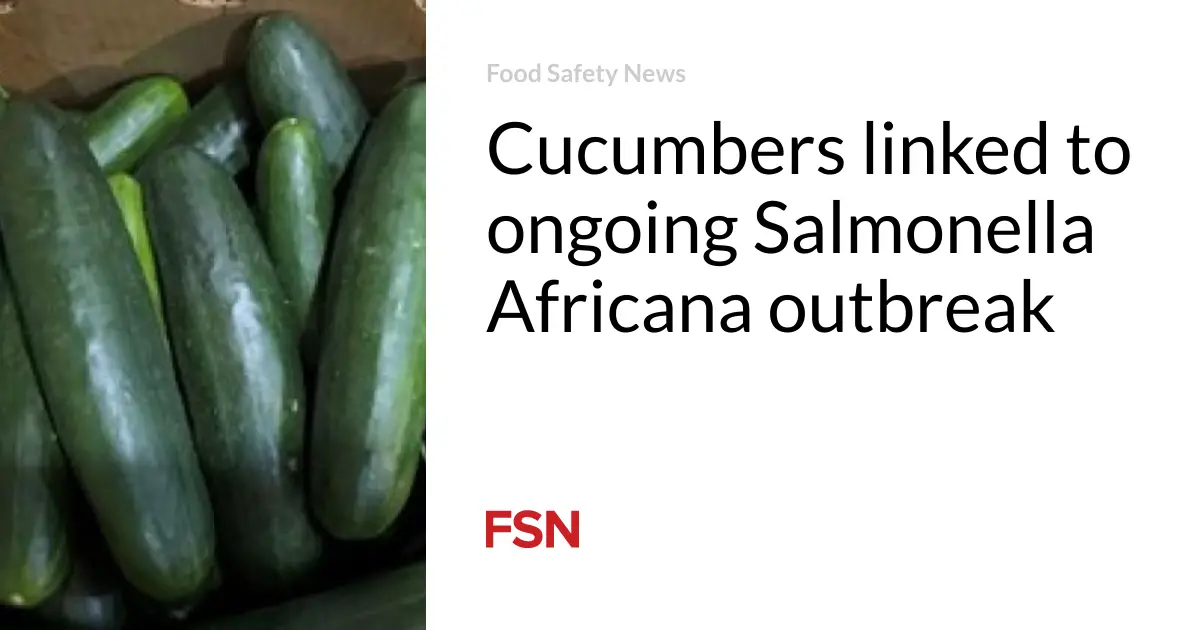
The Centers for Disease Control and Prevention, along with public health and regulatory officials in several states and the U.S. FDA, are investigating a multistate outbreak of Salmonella Africana infections potentially linked to cucumbers. Epidemiologic data indicate that cucumbers may be the source of contamination, causing illness among consumers.
As of June 4 162 cases of Salmonella Africana infection have been reported across 25 states and the District of Columbia. The onset of illnesses ranges from March 11 to May 16. Among the 127 individuals with available information, 54 have required hospitalization. As of the posting of this update, no deaths have been reported.
The actual number of infected individuals is likely higher than reported, as many people recover without seeking medical care or being tested for Salmonella. Additionally, recent cases might not yet be documented due to the time required to determine if a patient is part of the outbreak.
Public health officials have gathered various demographic details from the infected individuals to aid in pinpointing the outbreak’s source. The data reveal:
- Age: Ranging from less than 1 year to 92 years old, with a median age of 40
- Sex: 64 percent female and 36 percent male
Of 65 patients interviewed, 47 reported consuming cucumbers in the week before becoming ill.
The CDC’s PulseNet system, which manages a national database of DNA fingerprints for bacteria causing foodborne illnesses, has been instrumental in this investigation. Whole genome sequencing (WGS) of the bacteria from infected individuals shows they are genetically related, indicating a common source of infection.
Further analysis revealed that the bacteria from 162 samples exhibited resistance to fosfomycin, and in five cases, resistance was also found to other antibiotics, including amoxicillin-clavulanic acid, ampicillin, azithromycin, cefoxitin, ceftiofur, ceftriaxone, ciprofloxacin, and tetracycline. This antibiotic resistance complicates treatment for those who require antibiotics, although most Salmonella infections resolve without such interventions.
The Pennsylvania Department of Agriculture collected cucumber samples from retail locations, identifying Salmonella in a sample. Further testing is underway to confirm if this strain matches the outbreak strain.
CDC advises against eating, selling, or serving recalled cucumbers while the investigation continues. Fresh Start Produce Sales, Inc. has recalled whole cucumbers distributed in bulk from May 17 to May 21 to several states. The recall affects 14 states: Alabama, Florida, Georgia, Illinois, Maryland, North Carolina, New Jersey, New York, Ohio, Pennsylvania, South Carolina, Tennessee, Virginia and West Virginia.
Consumers are advised to:
- Avoid eating recalled cucumbers. Check with the store of purchase if uncertain.
- Wash items and surfaces that may have come into contact with the recalled cucumbers using hot, soapy water or a dishwasher.
- Seek medical attention for severe symptoms, such as high fever, prolonged diarrhea, bloody stools, or dehydration.
Businesses should:
- Cease selling or serving the recalled cucumbers.
- Clean and sanitize surfaces and items that may have been in contact with the cucumbers.
- Inform customers about the recall through signs or direct communication.
Anyone who has eaten cucumbers and developed symptoms of Salmonella infection should seek medical attention. Sick people should tell their doctors about the possible exposure to Salmonella bacteria because special tests are necessary to diagnose salmonellosis. Salmonella infection symptoms can mimic other illnesses, frequently leading to misdiagnosis.
Symptoms of Salmonella infection can include diarrhea, abdominal cramps, and fever within 12 to 72 hours after eating contaminated food. Otherwise, healthy adults are usually sick for four to seven days. In some cases, however, diarrhea may be so severe that patients require hospitalization.
Older adults, children, pregnant women, and people with weakened immune systems, such as cancer patients, are more likely to develop a severe illness and serious, sometimes life-threatening conditions.
Some people get infected without getting sick or showing any symptoms. However, they may still spread the infections to others.
(To sign up for a free subscription to Food Safety News, click here.)







